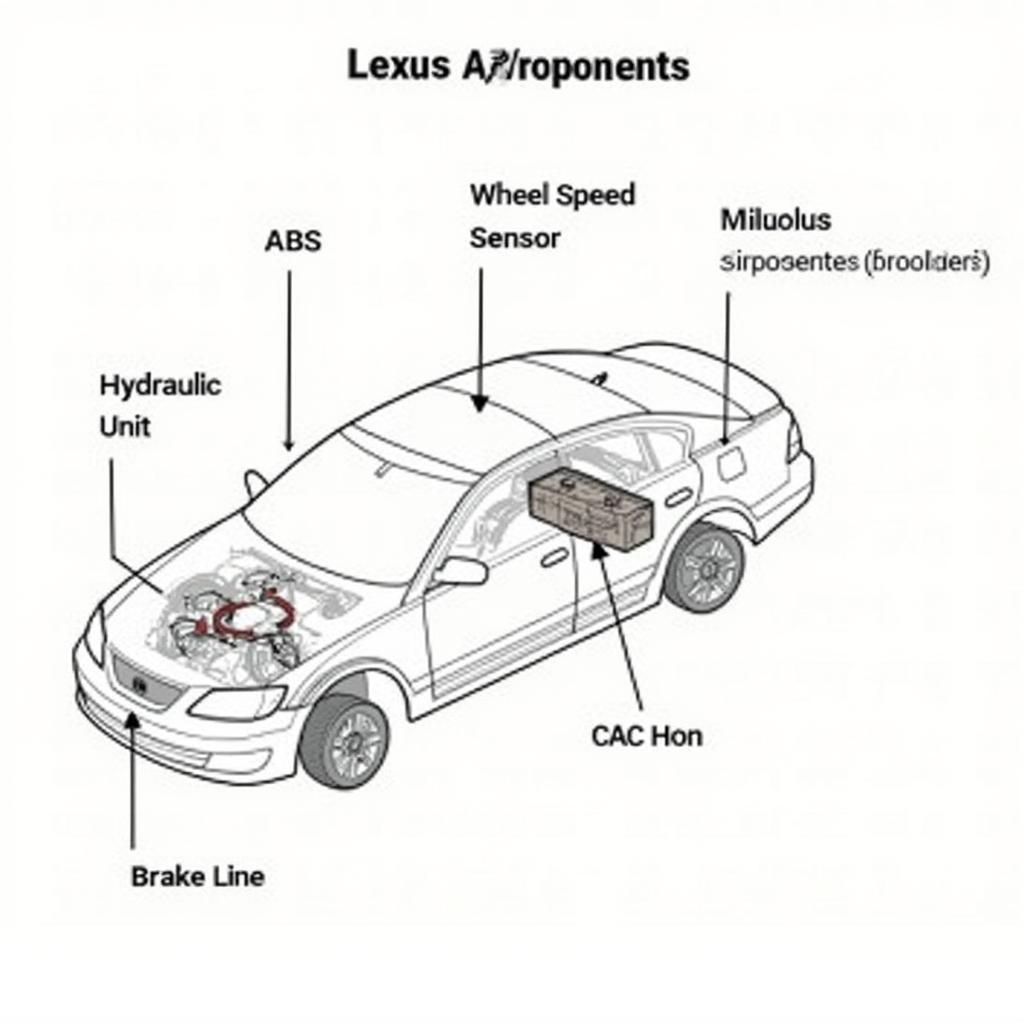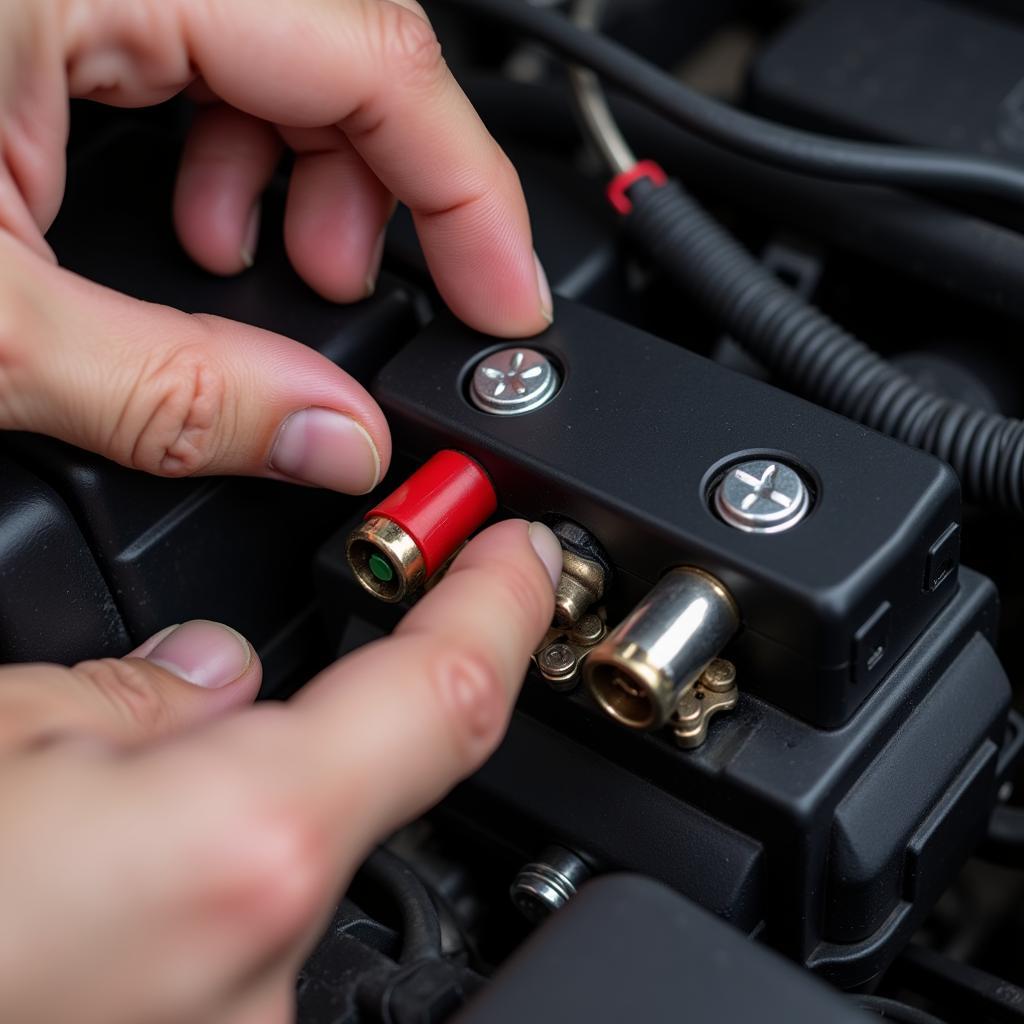Experiencing those dreaded Lexus ABS and brake warning lights illuminating your dashboard? Don’t panic. This comprehensive guide will walk you through the potential causes, diagnostic procedures, and even remote software solutions that can help address the issue and get you back on the road safely.
Understanding Your Lexus ABS and Brake System
Your Lexus’ Anti-lock Braking System (ABS) is a critical safety feature designed to prevent wheel lockup during hard braking, allowing you to maintain steering control. When the ABS light comes on, along with the brake warning light, it signals a potential problem within this system or the broader braking system itself. Ignoring these lexus abs brake warning lights can compromise your safety and potentially lead to costly repairs.
Common Causes of Lexus ABS Brake Warning Lights
Several factors can trigger those pesky lexus abs brake warning lights. These range from simple issues like low brake fluid to more complex problems requiring professional diagnostics.
- Low Brake Fluid: This is often the most common culprit. A leak in the brake lines or worn brake pads can cause the fluid level to drop, triggering the warning lights.
- Faulty ABS Wheel Speed Sensor: These sensors monitor the speed of each wheel and relay this information to the ABS control module. A malfunctioning sensor can disrupt the system and illuminate the warning lights.
- ABS Control Module Issues: The ABS control module is the brain of the system. If it experiences a malfunction, it can cause a range of problems, including the activation of the warning lights.
- Brake Hydraulic System Problems: Issues within the hydraulic system, such as a failing master cylinder or a leak in the brake lines, can also trigger the warning lights.
- Wiring Problems: Damaged or corroded wiring within the ABS system can disrupt communication and cause the warning lights to come on.
 Lexus ABS Brake System Components
Lexus ABS Brake System Components
Diagnosing Lexus ABS Brake Warning Lights
Diagnosing the exact cause of the lexus abs brake warning lights requires a systematic approach.
- Check Brake Fluid Level: Start with the simplest check. Open the hood and locate the brake fluid reservoir. If the fluid level is low, top it off with the correct type of brake fluid specified in your owner’s manual.
- Visual Inspection: Inspect the brake lines, calipers, and rotors for any signs of leaks, damage, or excessive wear.
- OBD-II Scanner: Use an OBD-II scanner to read the diagnostic trouble codes (DTCs) stored in the vehicle’s computer. These codes provide valuable clues about the specific area of the problem.
- Professional Diagnostics: If the issue persists, it’s best to consult a qualified Lexus technician who can perform more advanced diagnostics using specialized equipment.
Remote Software Solutions for Lexus ABS Brake Warning Lights
In some cases, the issue triggering the lexus abs brake warning lights may be software-related. Remote software solutions can be employed to address these problems.
- Software Updates: Lexus occasionally releases software updates for various vehicle systems, including the ABS. These updates can address bugs and improve system performance, potentially resolving the issue.
- Remote Diagnostics and Programming: Some specialized service providers offer remote diagnostics and programming services. They can access your vehicle’s computer remotely, diagnose the problem, and even install software updates or perform necessary programming adjustments.
“Remote diagnostics and programming are becoming increasingly valuable tools for addressing complex vehicle issues,” says John Miller, Senior Automotive Diagnostic Engineer at AutoTech Solutions. “They can significantly reduce diagnostic time and minimize downtime for the customer.”
What Should I Do If My Lexus ABS and Brake Lights Are On?
If you see both lights illuminated, it signals a potential problem with your braking system. Pull over safely and check your brake fluid level immediately. If it’s low, adding fluid might solve the issue temporarily, but it’s crucial to have a mechanic check for leaks. If the fluid level is normal, it’s best to avoid driving and have the car towed to a professional for diagnosis.
Preventing Lexus ABS Brake Warning Lights
Regular maintenance can help prevent many of the issues that trigger lexus abs brake warning lights.
- Regular Brake Inspections: Have your brakes inspected regularly as part of your routine maintenance schedule.
- Brake Fluid Flush: Flush and replace your brake fluid according to the manufacturer’s recommendations.
- Address Warning Lights Promptly: Never ignore any warning lights on your dashboard, especially those related to the braking system.
Conclusion
The lexus abs brake warning lights are important safety indicators. Addressing them promptly can help prevent further damage and ensure your safety on the road. By understanding the potential causes and following the diagnostic steps outlined in this guide, you can take proactive steps to resolve the issue and keep your Lexus running smoothly. Don’t hesitate to seek professional help if needed.
FAQ
- Can I drive my Lexus with the ABS light on? While you may still have braking functionality, your ABS system may be compromised. It’s best to avoid driving and have the car inspected.
- How much does it cost to fix Lexus ABS brake warning lights? The cost depends on the underlying cause. It could range from a simple top-up of brake fluid to more costly repairs like replacing an ABS sensor or control module.
- How do I reset the Lexus ABS light? Reseting the light typically requires addressing the underlying issue and using an OBD-II scanner to clear the diagnostic trouble codes. Sometimes, the light will reset itself after the problem is fixed.
- What is the difference between the ABS light and the brake warning light? The ABS light indicates a problem with the Anti-lock Braking System. The brake warning light usually signals low brake fluid or a problem with the overall braking system.
- Are aftermarket ABS parts recommended for Lexus vehicles? While aftermarket parts might be cheaper, using genuine Lexus parts is generally recommended for optimal performance and reliability.
- Can a low battery cause the Lexus ABS light to come on? While rare, a severely low battery can sometimes cause erratic behavior in various vehicle systems, including the ABS. Charging or replacing the battery might resolve the issue.
- How often should I check my Lexus brake fluid? It’s a good practice to check your brake fluid level at least once a month and during your regular vehicle maintenance checks.


